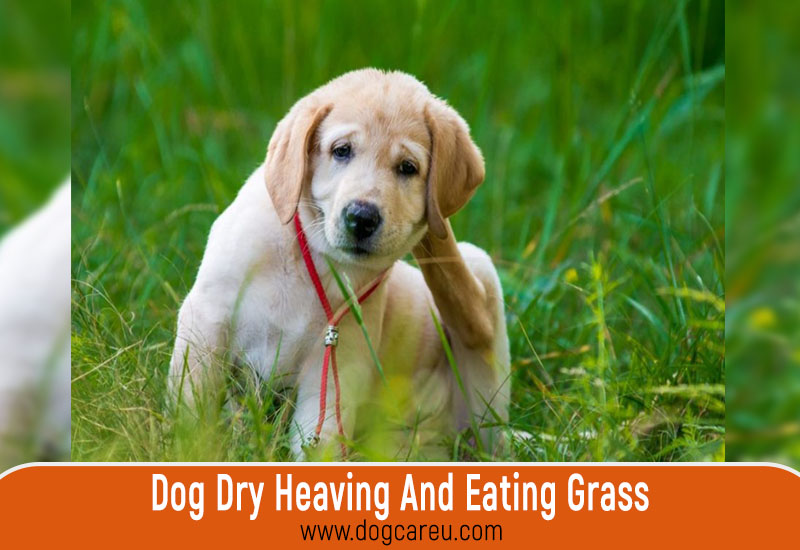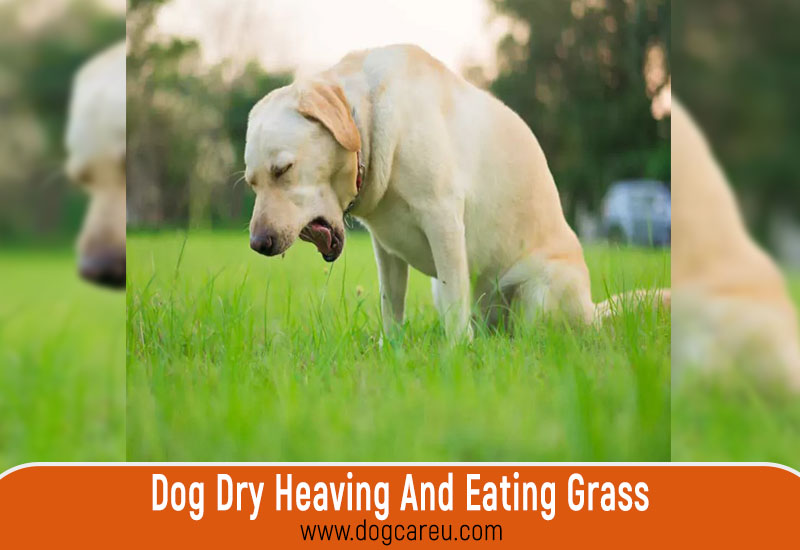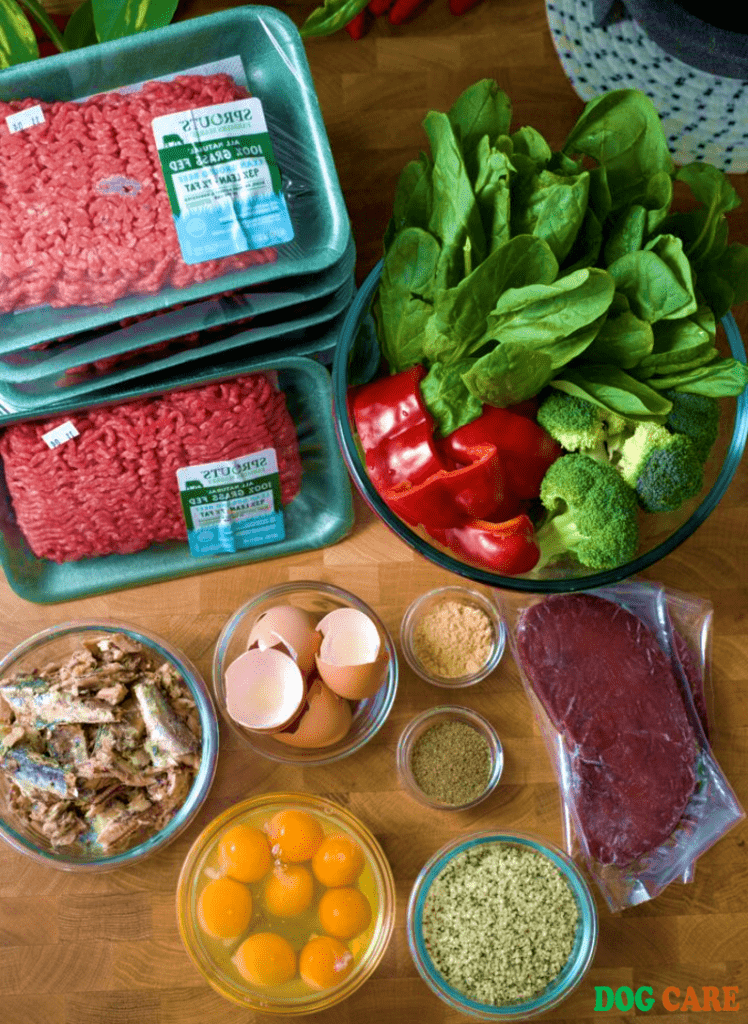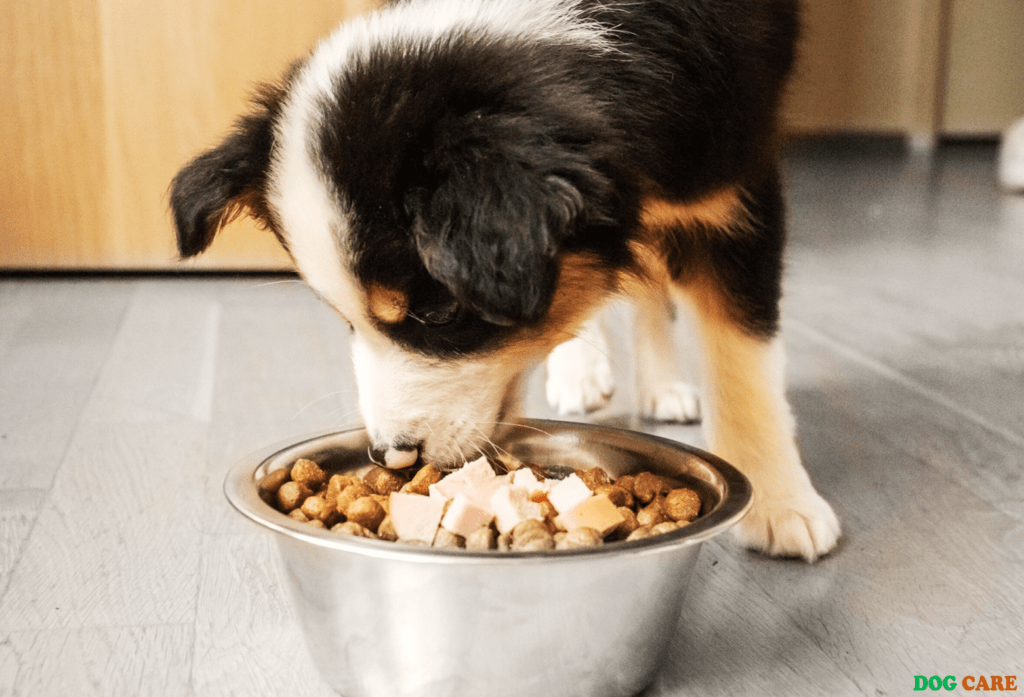Dog dry heaving and eating grass is often a sign of nausea and stomach upset in dogs. This behavior may help them feel better by inducing vomiting.
However, if your dog is constantly dry-heaving and eating grass, it could indicate more serious gastrointestinal issues that require veterinary attention. Signs of bloat, an enlarged abdomen, increased salivation, restlessness, and discomfort when the belly is touched are warning signs that immediate medical care is needed.
While occasional grass-eating and vomiting may not be a cause for concern, persistent dry heaving warrants a closer look by a professional. Understanding the reasons behind your dog’s behavior can help you provide the necessary care and support for their well-being.

Reasons Behind Dog Dry Heaving
Dry heaving in dogs, also known as involuntary retching, can be a concerning behavior for pet owners. Understanding the potential reasons behind dog dry heaving is vital to ensure the well-being of your furry friend.
Dog dry heaving and eating grass: Possible Causes Of Dry Heaving
Several factors can contribute to dog dry heaving, from dietary issues to underlying health concerns. It’s crucial to address these potential causes to provide your dog with the necessary care and attention.
- Irritation in the Throat or Gastrointestinal Tract
- Excessive Hairballs
- Respiratory Infections
- Gastrointestinal Distress
Connection To Grass Eating
It’s not uncommon for dogs to eat grass, and this behavior may be linked to their attempts to ease discomfort associated with dry heaving. Grass consumption can stimulate vomiting, allowing dogs to alleviate feelings of nausea or discomfort. However, it’s essential to monitor your dog’s grass-eating habits and consider potential underlying issues that may be contributing to their dry heaving.
Understanding Grass Eating In Dogs
Does your dog dry heave and eat grass? Dogs may eat grass and vomit to relieve nausea. If your dog shows signs of bloat, such as dry heaving, an enlarged abdomen, and increased salivation, immediate veterinary care is necessary. It’s important to monitor your dog’s behavior and consult a vet if you have concerns.
Natural Instincts
Dogs eating grass is a common behavior rooted in their instincts. Grass consumption may help with digestive issues and contribute to their overall well-being.
Possible Health Issues
- Eating grass excessively may indicate gastrointestinal problems.
- Dry heaving and grass consumption could be a sign of nausea or upset stomach.
- Monitoring your dog’s grass-eating habits is crucial to identify potential health concerns early.
When To Seek Veterinary Care
If your dog is experiencing episodes of dry heaving and eating grass, it can be a cause for concern. While occasional grass-eating may be normal for dogs, frequent or excessive episodes of dry heaving along with grass consumption may indicate an underlying health issue.

Signs Of Emergency
If your dog exhibits any of the following symptoms in addition to dry heaving and eating grass, it is important to seek veterinary care immediately:
- Dry heaving accompanied by an enlarged abdomen
- Increased salivation
- Restlessness
- Signs of pain when touching their belly
These symptoms could be indicative of bloat, a serious and potentially life-threatening condition that requires immediate medical attention.
Indications Of Serious Illness
If your dog’s dry heaving and grass-eating episodes are becoming more frequent or are accompanied by other concerning symptoms, it is crucial to consult with a veterinarian. Signs of serious illness may include:
- Repeated vomiting after grass consumption
- Weight loss
- Lethargy or decreased activity levels
- Loss of appetite
- Changes in bowel movements
- Visible discomfort or pain
These symptoms could be indicative of various gastrointestinal issues, such as gastritis, gastrointestinal obstruction, or gastrointestinal parasites. A thorough examination and diagnostic tests by a veterinarian will help identify the underlying cause and determine the appropriate course of treatment.
It is always better to err on the side of caution and consult a veterinarian if you have any concerns about your dog’s health. Prompt medical attention will ensure proper diagnosis and appropriate treatment, ultimately helping your furry friend feel better and maintain their overall well-being.
Managing Dry Heaving At Home
1. Monitor: Keep an eye on your dog’s behavior and frequency of dry heaving episodes.
2. Stay Hydrated: Ensure your dog has access to fresh water at all times.
3. Quiet Environment: Create a calm and quiet space for your dog to relax.
1. Balanced Diet: Provide a well-balanced diet suitable for your dog’s breed and age.
2. Avoid Table Scraps: Refrain from feeding your dog table scraps or human food.
3. Consult a Vet: Seek advice from a veterinarian for dietary recommendations.
Preventative Measures
Preventing dogs from dry heaving and eating grass involves understanding the underlying reasons behind these behaviors and implementing appropriate measures to address them. By focusing on avoiding grass consumption and wellness strategies, you can take proactive steps to minimize the risk of these issues in your canine companion.
Avoiding Grass Consumption
Limiting your dog’s access to grass can play a key role in preventing them from ingesting it and potentially experiencing digestive discomfort. Consider the following tips to minimize grass consumption:
- Supervise your dog during outdoor activities to discourage them from eating grass.
- Provide a designated potty area with no access to grass to minimize ingestion.
- Utilize dog-friendly deterrent sprays on the grass to discourage consumption.
Wellness Strategies
Supporting your dog’s overall well-being can contribute to reducing the likelihood of dry heaving and grass consumption. Implement the following wellness strategies:
- Maintain a balanced and nutritious diet to support digestive health.
- Regularly exercise your dog to alleviate stress and promote good overall health.
- Consult with a veterinarian to address any underlying health issues that may prompt grass eating or dry heaving.
Consulting A Professional
When dealing with a dog’s dry heaving and eating grass, it’s essential to consult a professional to ensure your pet’s well-being. A veterinarian can provide valuable insight and guidance to address the reasons behind the behavior and ensure proper care for your furry friend.
Importance Of Veterinary Guidance
Seeking veterinary guidance is crucial when your dog exhibits unusual behaviors such as dry heaving and consuming grass. Veterinarians can perform thorough examinations to identify any underlying medical conditions causing these behaviors, ultimately ensuring the health and safety of your pet.
Behavioral Analysis
Through behavioral analysis, a professional can offer insight into your dog’s actions, identifying potential triggers or environmental factors contributing to the behavior. This analysis can help you better understand your dog’s needs and take appropriate measures to address any behavioral concerns.
Frequently Asked Questions
Why Do Dogs Eat Grass And Dry Heave?
Dogs eat grass and dry heave to relieve nausea. It helps them feel better by inducing vomiting, like how humans might feel better after throwing up. If your dog is constantly eating grass and vomiting, it could be a sign of gastrointestinal problems, and you should take them to the veterinarian.
Why Does My Dog Gag And Then Eat Grass?
Dogs may gag and eat grass to relieve nausea like humans feeling better after vomiting. Check with a vet for underlying health concerns if vomiting persists.
When Should I Worry About Dry Heaves In Dogs?
If your dog has dry heaves, watch for signs of bloat and seek urgent vet care. Look for an enlarged abdomen, increased salivation, restlessness, and belly pain. If your dog vomits after eating grass occasionally and seems fine afterward, it’s likely not concerning.
Should I Be Worried If My Dog Eats Grass And Throws Up?
If your dog eats grass and throws up occasionally, it’s usually not a cause for concern. Dogs may eat grass to alleviate nausea, similar to how people feel better after vomiting. However, if your dog shows signs of bloat or vomiting constantly, urgent veterinary care is necessary.
Why Do Dogs Eat Grass And Vomit?
Dogs may eat grass and vomit to alleviate nausea, similar to how people feel better after throwing up.
Why Does My Dog Gag And Then Eat Grass?
If a dog is constantly eating grass and vomiting, it could be a sign of gastrointestinal problems and a visit to the vet is necessary.
When Should I Worry About Dry Heaves In Dogs?
If your dog shows signs of bloat, such as dry heaving, an enlarged abdomen, increased salivation, restlessness, and signs of pain when touching their belly, urgent veterinary care is required.
Conclusion
To sum up, if your dog is dry heaving and eating grass, it could be due to various reasons such as upset stomach, boredom, or underlying health issues. Monitoring their behavior and seeking veterinary care if needed is essential for their well-being.
Understanding their actions can help ensure a healthy and happy dog.


